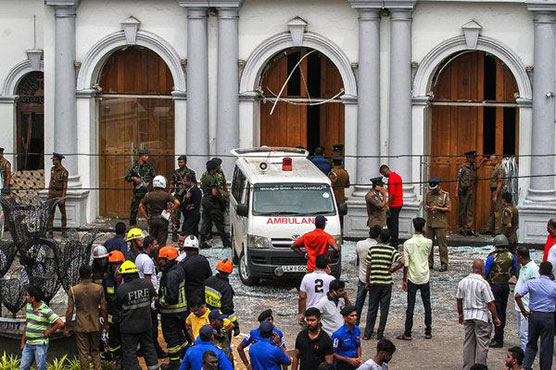Sri Lanka blocks social media after anti-Muslim riots

Christian groups attacked Muslim-owned shops in a sign of the continued religious tension.
COLOMBO (AFP) - Sri Lanka blocked Facebook, WhatsApp and other social media platforms on Monday after anti-Muslim riots hit several towns in the latest fallout from the Easter Sunday suicide attacks.
Christian groups attacked Muslim-owned shops in a sign of the continued religious tension in Sri Lanka since the April 21 attacks by jihadist suicide bombers on three hotels and three churches which left 258 dead.
A state of emergency has been in place since the bombings -- which the Islamic State group claims to have helped -- and security forces have been given sweeping powers to arrest and detain suspects for long periods.
Police said a mob targetted shops in the north-west town of Chilaw on Sunday in anger at a Facebook post by a shopkeeper. Security forces fired into the air to disperse the crowd, but the violence spread to nearby towns where Muslim businesses were also attacked.
A motorcycle gang attacked shops in nearby Kuliyapitiya and four members were arrested, officials said. However, dozens of people laid siege to the police station and forced their release.
Despite a night curfew, a mosque was vandalised, local residents said.
Police said the curfew in Chilaw and nearby areas was relaxed Monday, but the social media ban was brought in to head off new violence.
Mosque attack
"Don’t laugh more, 1 day u will cry," was posted on Facebook by a Muslim shopkeeper, and local Christians took it to be a warning of an impending attack.
Mobs smashed the man’s shop and vandalised a nearby mosque prompting security forces to fire in the air to disperse the crowd. A curfew was imposed from Sunday afternoon until dawn Monday.
There have already been clashes between Christians and Muslims in Negombo, the town north of Colombo that was one of the targets for the suicide attackers.
The main body of Islamic clerics, the All Ceylon Jamiyyathul Ulama (ACJU), said there was increased suspicion of Muslims after the Easter attacks carried out by local jihadists.
"We call upon the members of the Muslim communities to be more patient and guard your actions and avoid unnecessary postings or hosting on social media," the ACJU said.
Internet service providers said they have been instructed by the telecommunications regulator to block access to Facebook, WhatsApp, Instagram and other platforms.
The latest unrest came as Catholic churches resumed Sunday masses for the first time since the bombings.
Worshippers were searched before being allowed into churches that were guarded by armed police and troops. There were no reports of disruption to services however.
Schools reopen
Dozens of people have been detained since the Easter Sunday attacks, and amid the heightened security, police have banned parking near schools and students are allowed in after checking for explosives.
Public schools completed their reopening from extended Easter holidays after the attacks, but attendance was low, according to education authorities.
Upper classes resumed last week while primary school pupils were asked to start Monday.
Private Catholic schools were to open on Tuesday, but many were planning to postpone the reopening until next week, parent groups said.
Muslims make up around 10 percent of Buddhist-majority Sri Lanka’s 21 million population and Christians about 7.6 percent.

